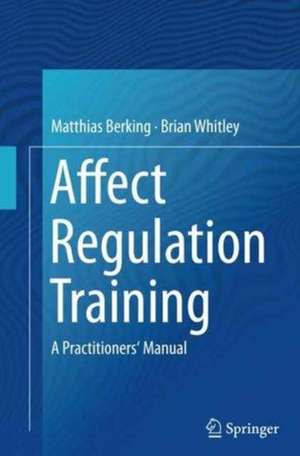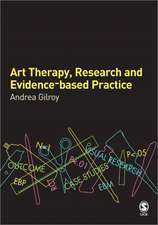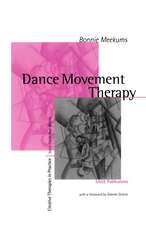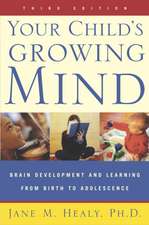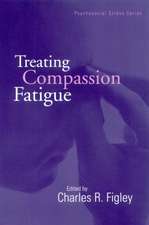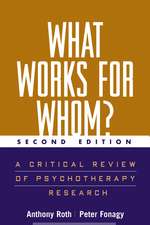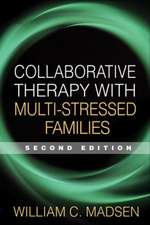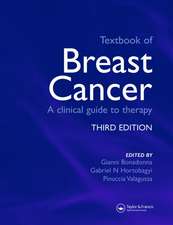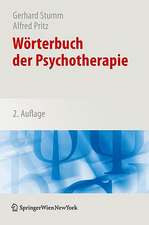Affect Regulation Training: A Practitioners' Manual
Autor Matthias Berking, Brian Whitleyen Limba Engleză Paperback – 11 sep 2016
| Toate formatele și edițiile | Preț | Express |
|---|---|---|
| Paperback (1) | 467.41 lei 38-45 zile | |
| Springer – 11 sep 2016 | 467.41 lei 38-45 zile | |
| Hardback (1) | 714.59 lei 6-8 săpt. | |
| Springer – 30 aug 2014 | 714.59 lei 6-8 săpt. |
Preț: 467.41 lei
Preț vechi: 492.01 lei
-5% Nou
Puncte Express: 701
Preț estimativ în valută:
89.44€ • 95.64$ • 74.57£
89.44€ • 95.64$ • 74.57£
Carte tipărită la comandă
Livrare economică 14-21 aprilie
Preluare comenzi: 021 569.72.76
Specificații
ISBN-13: 9781493947454
ISBN-10: 1493947451
Pagini: 260
Ilustrații: X, 250 p. 124 illus., 94 illus. in color.
Dimensiuni: 155 x 235 mm
Greutate: 0.45 kg
Ediția:Softcover reprint of the original 1st ed. 2014
Editura: Springer
Colecția Springer
Locul publicării:New York, NY, United States
ISBN-10: 1493947451
Pagini: 260
Ilustrații: X, 250 p. 124 illus., 94 illus. in color.
Dimensiuni: 155 x 235 mm
Greutate: 0.45 kg
Ediția:Softcover reprint of the original 1st ed. 2014
Editura: Springer
Colecția Springer
Locul publicării:New York, NY, United States
Cuprins
Emotion Regulation and Mental Health.- ART Development Model of Emotion Regulation Deficits.- Use of affect regulation training as a psychological intervention.- Guidelines for effective delivery of affect regulation training.- Training format and logistics.- ART module one- introduction and psychoeducation.- ART module two- muscle and breathing relaxation.- Module three- psychoeducation part II (The importance of regular practice).- Module four - nonjudgemental awareness.- Module five- acceptance and tolerance.- Module six- compassionate self-support.- Module seven- analyzing emotions.- Module eight- modifying emotions.- Module nine- Additional practice using ART skill #6 (Analyzing Emotions) & ART Skill #7 (modifying emotions) with common challenging emotions.- Program evaluation, efficacy findings, and future opportunities.- closing words.
Notă biografică
Dr. Matthias Berking is a Professor for Clinical Psychology and Psychotherapy at the University of Marburg/Germany. He is also a licensed psychotherapist trained in a wide range of empirically-validated interventions. In the past decade, Dr. Berking has focused on clarifying the relevance of emotion regulation skills for the development and maintenance of mental disorders. He has published numerous research articles and books on this subject and has run several large clinical trials evaluating interventions that aim to enhance emotion regulation skills in clinical and at-risk populations. He lives in Marburg, Germany, with his wife and three children. Brian Whitley, M.A. is a Licensed Marriage and Family Therapist with a counseling practice in Irvine, California. Brian has a unique background with 11 years of experience as a police officer. As a former police officer, Brian actively participated in several domestic violence intervention programs and shared his knowledge of domestic violence with others including medical students, law enforcement, and psychology graduate students. Brian now uses his background to assist other officers to manage the stressors of law enforcement more effectively. He lives in Orange County, California with his wife and two children.
Textul de pe ultima copertă
No one is immune to intense emotions--and whether we accept them and how we regulate them can mean the difference between mental health or illness. The critical role of these complex emotional skills in human well-being is at the core of Affect Regulation Training (ART), which is gaining ground as both a preventive method and an adjunct to other therapies.
Affect Regulation Training combines a step-by-step manual for conducting ART with patients with an extensive review of how and why the method works. Introductory chapters analyze the relationship between deficits in emotion regulation and mental dysfunction, explain the theory behind the ART model, and offer practical ideas for optimizing treatment. The manual identifies component skills of ART such as nonjudgmental awareness and compassionate self-support, pinpoints situations in which the skills are beneficial, and provides exercises employing them individually and in combination. An evaluation section features empirical findings and feedback from therapists and clients. Included in the coverage:
Affect Regulation Training combines a step-by-step manual for conducting ART with patients with an extensive review of how and why the method works. Introductory chapters analyze the relationship between deficits in emotion regulation and mental dysfunction, explain the theory behind the ART model, and offer practical ideas for optimizing treatment. The manual identifies component skills of ART such as nonjudgmental awareness and compassionate self-support, pinpoints situations in which the skills are beneficial, and provides exercises employing them individually and in combination. An evaluation section features empirical findings and feedback from therapists and clients. Included in the coverage:
- Emotion regulation: definition and relevance for mental health.
- Guidelines for effective delivery of ART.
- Linking ART skills to build successful interventions.
- Creating goals that result in effective self-management.
- Recommended education and training for therapists.
- PLUS a complete ART manual with target skills, delivery modules, and recommended intervention sequences.
Caracteristici
Reflects the current treatment in psychology to improve regulation abilities Artfully synthesizes an eclectic mix of psychotherapeutic interventions that appeal to a wide treatment population Detailed explanations of the interventions facilities use of the manual Includes supplementary material: sn.pub/extras
